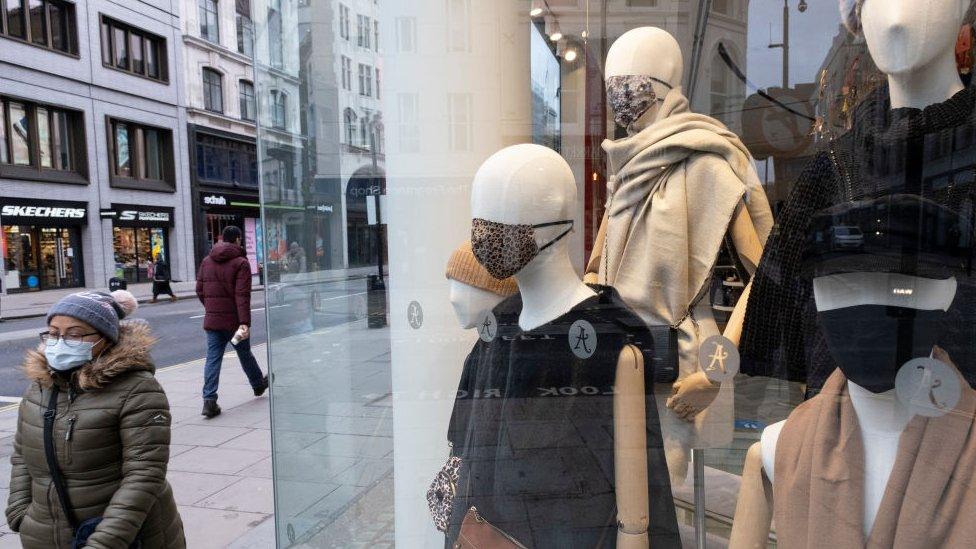Is England's café culture set for a boost?
- Published
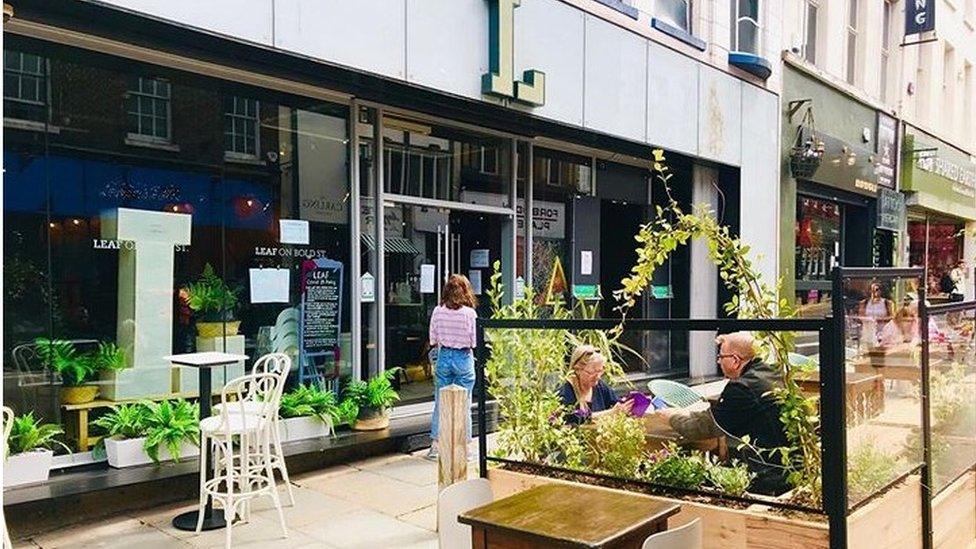
Leaf Group will be one of hundreds of cafe companies around the UK that has expanded outdoor seating in time for the reopening of hospitality
Natalie Haywood's fondest memory of 2020 is sitting outside in the blazing evening sunshine, eating pizza with her little girl on Liverpool's Castle Street: "We really felt like we were in Italy."
Natalie co-owns the Leaf Group of venues in Merseyside, including the Oh Me Oh My and One Fine Day cafés. And for her businesses, being able to serve people outside was "an absolute lifeline".
"It got our staff back to work. It gave customers options when they didn't feel confident going indoors and it gave city streets a new energy," she enthused.
"It's made us feel like we were on holiday when we couldn't go anywhere."
Reopening on 12 April may not guarantee pleasant outdoor temperatures, but it does have the potential to herald a surge in European-style café culture.
This spring, hundreds of English bars, pubs and restaurants are successfully applying for outside drinking and dining licences.
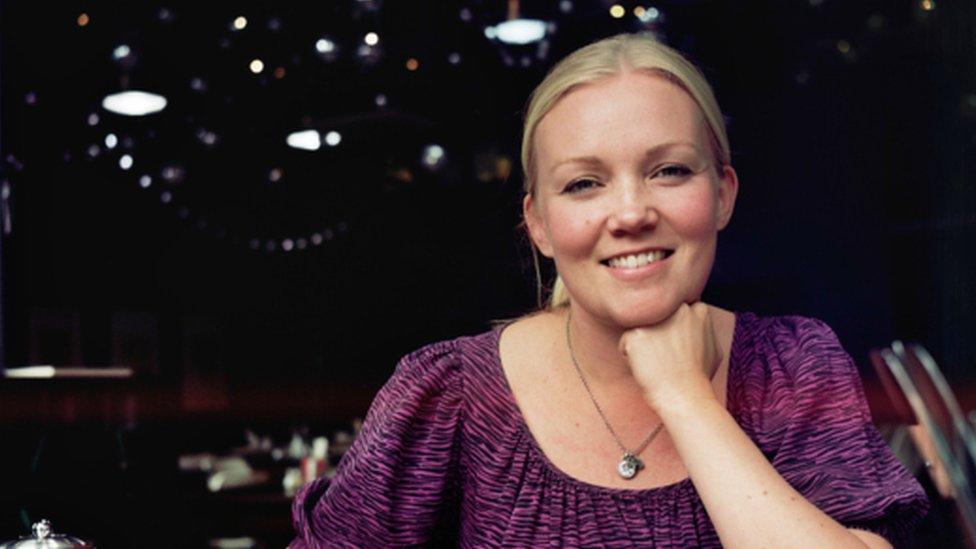
Natalie Haywood said the reopening of outdoor dining will be a "lifeline" for her business
The BBC contacted 10 councils in the largest metropolitan areas in England, where collectively more than 840 pavement licensing applications have been approved ahead of restrictions easing next week.
The councils managed the relaxed licensing laws differently. In most cases, a business applied to use the pavement or space outside their premises.
But in heavily built-up Westminster, 60 designated "zones" were approved, so that venues can put tables out in parking bays or pavements.
A similar project exists in nearby Camden called Streateries, while in Bristol, entire stretches of road have been pedestrianised.
Liverpool has been one of the most active councils, approving almost 200 temporary licences for business, as well as running a grant scheme last year to help hospitality providers buy outdoor seating, heaters and shelters.
On Bold Street, Natalie's business was able to use a series of council-built "parklets" - outdoor seating to be shared by other hospitality spaces.
"It meant we could serve 30 to 40 more covers outside, and over a day, turned those over five or six times," she said. "We pay phenomenal rates, so without outdoor seating, we'd have been in a real pickle."
Garden space
But these city centre schemes only tell part of the story. The figures do not take into account the thousands more businesses with private land that did not need to make an application to their council.
Their existing licensing agreements covered them for refinements such as pop-up gazebos, as well as seating in car parks and loading bays, or even fields and woodlands.
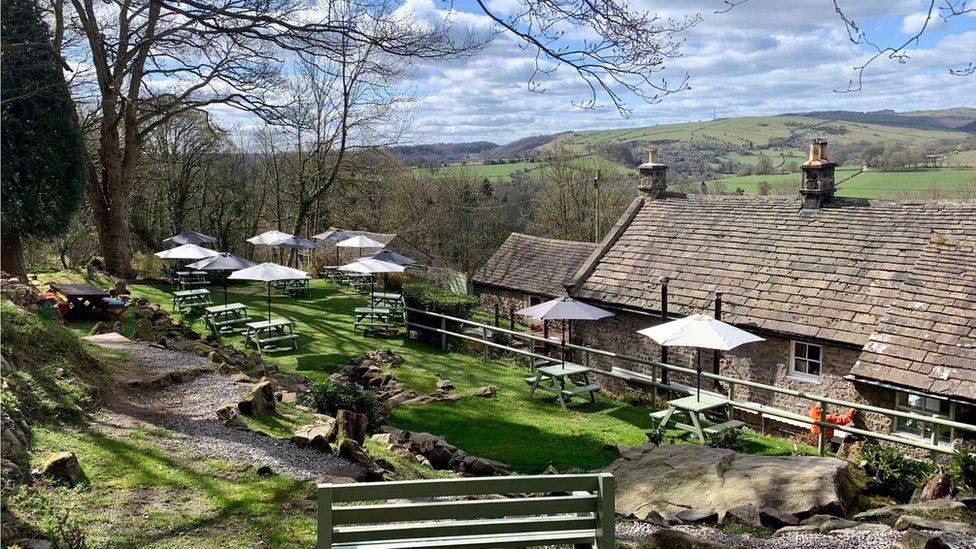
The owners of the Chequers Inn did the garden makeover during lockdown
The garden at the Chequers Inn twists and winds up to limestone cliff tops. Nine white parasols are dotted among the daffodils, allowing punters to enjoy a pint while gazing across Hope Valley in the Peak District.
Last year, the area was largely overgrown. Owners Joanne and Jonathan Tindall have uncovered about three-quarters of an acre of extra outdoor space. But they have invested heavily, giving up both time and money.
"In lockdown at home, people have been doing jobs they didn't have time to do," says Jonathan. "This is exactly the same for us. Except we did it for the business."
Weeds and rampant rhododendrons have been razed. Paths and platforms have been created around the natural stream. Their son even built a handsome 12-seat bench in between his online-only university lectures.
Jonathan and Joanne feel the pandemic has given them the gift of time in what is normally a hectic business. Their investment is for much more than Covid compliance.
"We wanted to do something that was not just for the five weeks, we wanted to improve the offering on a permanent basis," Jonathan explains.
Sunshine hopes
There is now space for 20 more people to eat outside, using new furniture, umbrellas, awnings, heating and lighting.
"You'll find people perched on corners of stones, sat on the walls, or using the deckchairs we can put out," Jonathan says. "Kids can go off into the woods to play now."
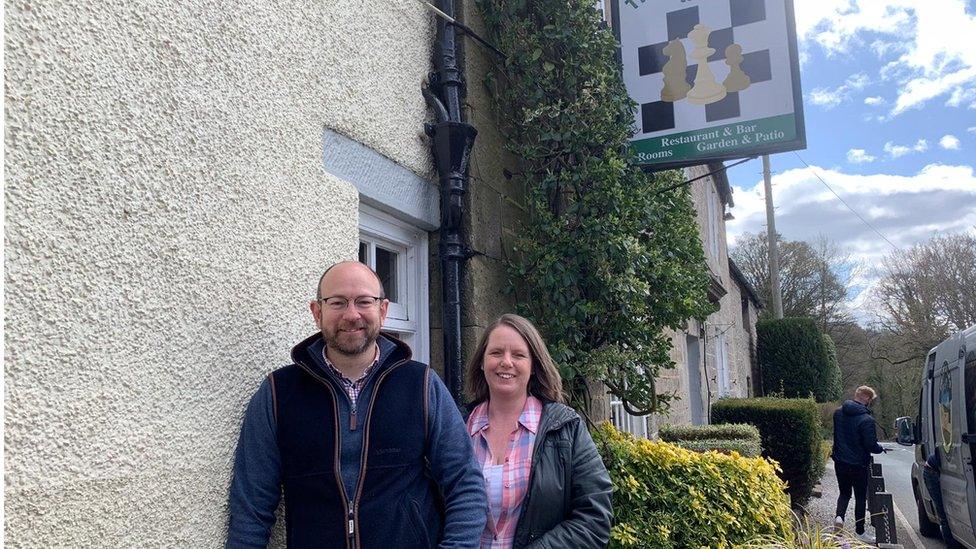
Chequers Inn owners Joanne and Jonathan Tindall
Joanne adds: "But we are a business. We are not playing at this and we need to get some money in the bank. We just need one thing - sunshine."
The hospitality industry estimates that as many as two-thirds of businesses will just wait until 17 May to open up indoor space. Going "al fresco" is neither easy nor cheap and depends a lot on location.
And England's pavement licensing and planning relaxation is only temporary, running up to September 2021.
The Great British Summer will hold a lot of sway. But it will be down to government, councils, businesses and consumers to decide if England keeps its café culture for good.

The 10 councils contacted
Westminster - more than 60 dining zones on streets in Soho for hundreds of restaurants
Camden - 144 pavement licences approved so far, plus Streateries scheme
Manchester - had 200 licences in 2020. Then 90 more approved in 2021, with another 16 under review
Liverpool - 189 applications for pavement drinking and dining approved so far
Newcastle - granted 104 pavement licences in the last year, including Grey Street
Leeds - 29 licences granted in the city centre, five in suburban districts
Sheffield - granted 60 licences in 2020 with no need to reapply. New applications in process
Nottingham - granted 105 licences in total, 45 are new extensions to business
Bristol - processing more than 60 applications. Pedestrianised Old City, King St, Cotham Hill and Portwall Lane
Birmingham - has been supporting local businesses, but could not provide figures on licences

- Published14 July 2021

- Published5 March 2021
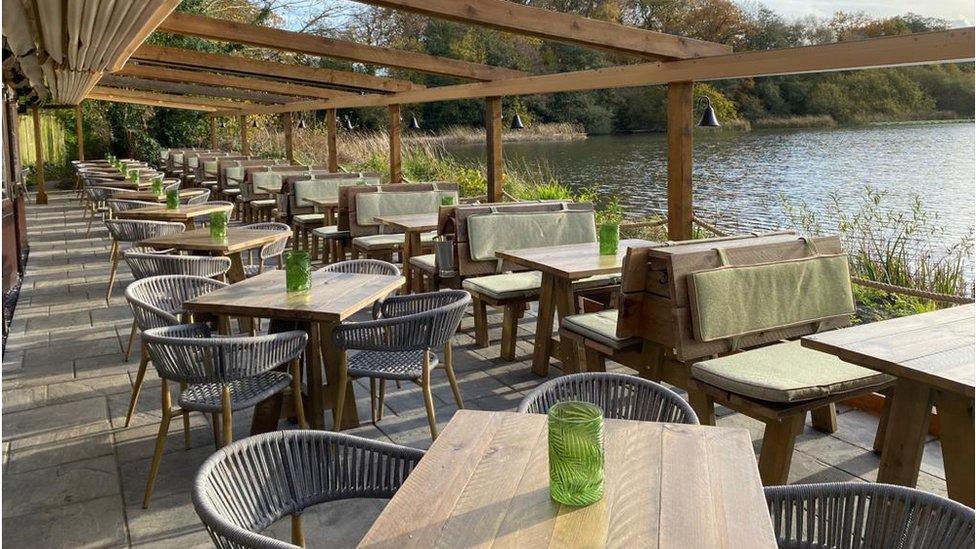
- Published8 April 2021
